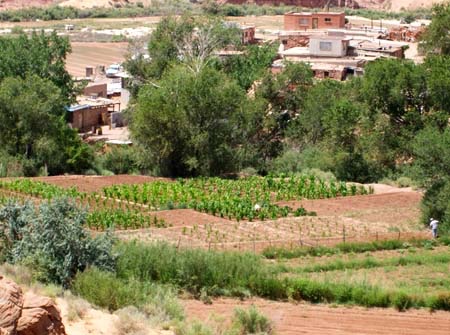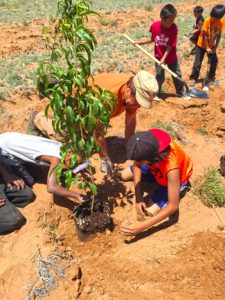
May, 2015 orchard planting with Natwanhoym Tunatya.
Farming, Orchard, garden and healthy eating projects in support of Hopi food sustainability.
There is growing interest at Hopi in permaculture food raising and with increasing participation in the traditional dry farming using ancient technologies and heirloom seeds that Hopi farmers have cultivated for centuries.
Orchards, edible shrubs, herbs, kitchen garden projects using low water drip systems and permaculture design-with-nature practices (such as mulching, companion planting, contouring, rain cisterns) are part of creating more local food supply and healthier diet for Hopi food sustainability. In recent years the Hopi Food Co-op and seasonal Hopi Farmer’s Market has been created.We have provided donations for several years to Hopi initiated projects that increase Hopi food sustainability.
Here are 3 groups doing effective Hopi food sustainability work.
Hopi Tutskwa Permaculture
Hopi Tutskwa Permaculture vision statement (founded in 2004):
“Hopi Tutskwa Permaculture Institute is a 501(c)3 U.S. non-profit fueled by passionate people. We are a community-based organization, initiating hands-on learning projects that support Hopi youth and community to develop skills and practical experience needed to promote a more ecological and healthy Hopi community.”
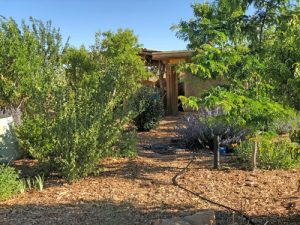
Orchard in 7th year Kykotsmovi with companion plantings (guilds and wind break trees) and heavy mulching thrive with very little watering. Photo by Sandra Cosentino 2018.
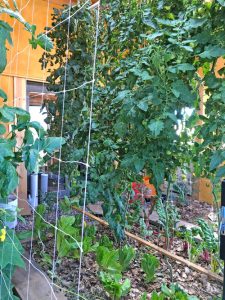
Solar Greenhouse part of new natural home by Hopi Tutskwa Permaculture.
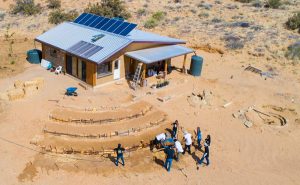
2017 Straw bale natural home with start of food growing terraces by Hopi Tutskwa Permaculture.
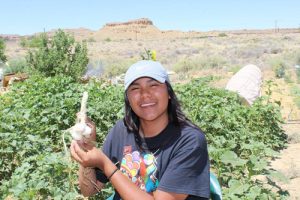
Garlic harvest by Hopi Tutskwa Permaculture.
Hopi Tutskwa Permaculture envisions a world in where:
- “Communities practice cooperation in all aspects of life, continuing the traditional Hopi values of Sumi’nangwa and Nami’nagwa which means to help others selflessly for the good of everyone.
- Communities learn to value, care for, respect, protect, and manage the natural environment while ensuring adequate resources for the future generations.
- Communities will learn innovative ways towards creating sustainable communities locally and regionally.
- Communities have clean water, good nutritious food, and thriving ecosystems and watersheds. ”
Quotes above from Hopi Tutskwa Permaculture website.
We were pleased to support some of their individual projects with the goal for them to become a viable food-producing installation and a learning opportunity for other Hopis.
Natwani Coalition
Natwani Coalition is part of the Hopi Foundation. “The Natwani Coalition is an affiliation of Hopi organizations and individuals dedicated to preserving Hopi farming traditions, strengthening the local Hopi food system and developing innovative sustainable strategies to promote wellness.”
Some of their current projects are: Hopi Natwani for Youth Farming Curriculum. “Importantly, the curriculum is grounded in a philosophy that is determined by the Hopi values and knowledge systems; therefore such a curriculum is not simply about transferring knowledge on “how to farm” to the younger generation—it is a living process that contributes to a quality of life (physical, spiritual, emotional, and mental wellness). The curriculum involves an understanding of the origins of our existence and how we are held accountable to the past, present and future through the very process of farming.”
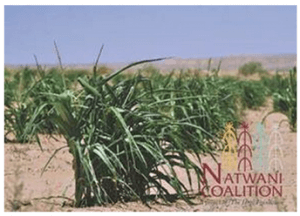
Hopi Farm Talk on Hopi radio. This program covers issues, both cultural and modern that affect Hopi way of life as Hopi farmers and food preparers. Traditional knowledge sharing is encouraged.
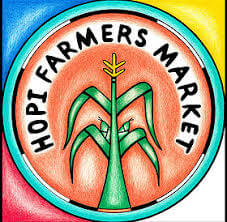
Hopi Farmer’s Markets in partnership with the Hopi Food Co-Op and Hopi Special Diabetes Program organizes seasonal farmer’s markets at Hopi. Natwani supports self-sustainability and encourage eating locally grown foods from wild foods to traditional crops. The goal of the farmer’s markets is to bring education and awareness in health, diet, and cultural teachings related to food.
Hopi Heirloom Seed Initiative: Preservation & Protections. Hopi women are the primary caretakers of the seeds.
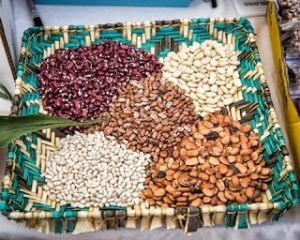
Agricultural and Food Symposium is presented every 2 years. “A gathering of Hopi & Tewa community members to engage in topics, educational presentations, networking, sharing, and conversation around the topics of food, farming, and agriculture.”
Hopi Youth Farm Group
Natwanhoyum Tunatya (means teach and farm together for the future) at Second Mesa, Hopi. Farming at Hopi is a whole set of values and spiritual practices.
A 5-year old in this group said, “If we don’t farm, our village will die.”
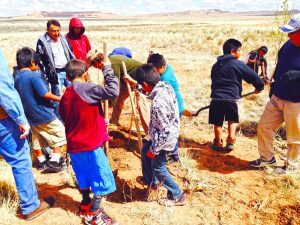
Information about the group provided by Natwanhoyum coordinators: “Natwanhoym Tunatya was founded in 2012 by two Hopi farmers and 28 Youth Farmers, the purpose of this Hopi-based service group is to develop a farming relationship with the Shungopavi youth between 6 – 18 years of age.
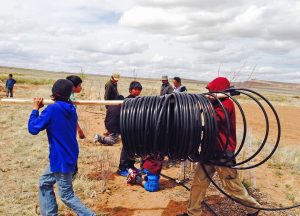
Natwanhoyum Mission:
Namitnagwa – to teach and practice the principal of farming together Samitnagwa – to teach the growth process of natwani (means produce and refers to the processes and rituals necessary for the rejuvenation of all life) and its values.
Providing natwani to their family table, ceremonies and social events.
To practice organic gardening–both with Hopi traditional dry farming and using drip irrigation–and promote healthy eating habits.
To teach Hopi language and art (which is part of livelihood on the Hopi reservation)
Philosophy of the Coordinators: Promote good guardianship and stewardship of the Natwanhoyum Resources today and tomorrow to benefit the current and future generations.
Core Values: Share core values from our Elders and Kiva teachings of Hopi character and identity that one must practice to be a good person:
- Respect all life
- Work hard
- Wake up early and pray to Dawa (the sun)
- Be humble
- Uphold conservation practices for all natural resources
- Be good role models
- Promote quality mentorship
- Promote traditional reciprocity, Pa’ung’ne/Namitnagwa
- Use personal experience and education to promote Hopi and modern land and water conservation practices
Vision To stay connected to Mother Earth while we pray to Dawa, our father. Through our prayers we ask to be blessed with rain so that our crop fields and grasslands have sufficient water for food production for healthful life.
Over many years we provided plants, learning and art supplies, tractor repair, and an instructor for the the installation of their drip-system supported orchard-vines-herbs garden adjacent to the dry farm area of their coordinators. We then did continued support with additional plants, mulch hauling, camping and learning supplies, and additional pruning and permaculture workshops with Sedona orchardist Mario Valeruz.
